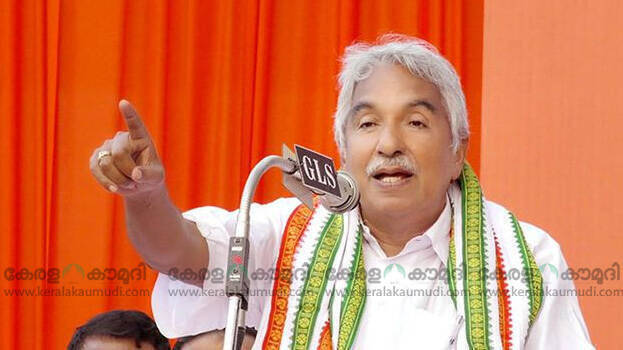

BENGALURU: Former Chief Minister Oommen Chandy passed away Tuesday morning. He was 79. Chandy died leaving the term of being the most popular among the chief ministers who ruled Kerala. He died at the Chinmaya Mission Hospital in Bengaluru. He died while undergoing treatment for cancer. He died at 4.25 am this morning. Chandy’s son Chandy Oomman informed the news through his Facebook page.
The body will be brought to Thiruvananthapuram from Bengaluru. It will be later taken to Puthupally and will be laid to rest there.
Chandy is a leader who has completed more than half a century in his legislative career, winning eleven consecutive victories in the Puthupally constituency of Kottayam without knowing what defeat is. Owning this extraordinary achievement, the honour of being the first MLA of the Indian National Congress in India was also owned by Chandy, who is nicknamed Kunjunju by the people of Puthupally. Late K M Mani, who recorded 13 consecutive victories and 52 years as a member of the legislature in Pala constituency, is the only representative in Kerala who has achieved this feat before.
Chandy has a special place in the minds of the Malayalees as a leader who lives among the people. Oommen Chandy's personality and working style are liked by people irrespective of party politics. His nature drew people to him like a magnet which is not artificially created. It is the result of his tireless efforts to listen carefully to the grievances of the people and find solutions to them to the best of his ability. Even as chief minister, the protocol of power did not stop Oommen Chandy from interacting with the people. He was a chief minister whom even the most common man could easily approach.
Everyone describes Chandy as a popular leader. He was able to stand with the people as one of the people, without the trappings of power or status, without the appearance of being tied up.
He was an administrator who believed that the decisions taken while in power should be beneficial to the lowest strata of the society. Chandy's philosophy was that politics should be for the welfare and development of the state.
Chandy entered the political arena through the student movement KSU. He then became the state president of the KSU and Youth Congress and contested for the first time in 1970 from Puthupally. Chandy's victory included defeating CPM's sitting MLA E M George in that constituency, which was thought to have no chance of victory for the Congress. He was 27 years old at that time.
Chandy, the labour minister in K Karunakaran's cabinet in the second term, introduced unemployment benefits for the first time to the unemployed youth in Kerala. Later, he worked in various ministries and it was while he was the home minister that he made a radical change in the police uniform from khaki shorts to pants. When he was the finance minister, Oommen Chandy presented each of his budgets with the concept of public financial management. He was a leader who did not hesitate to leave them, as he held ministerial posts. There are instances where he stayed away without joining the cabinet.
Chandy took charge as the chief minister of Kerala on August 31 in 2004 when A K Antony resigned as chief minister. During hia twenty-month rule, he tried as the chief minister to focus on development issues. He was able to address the grievances of lakhs of people through the public relations program which he initiated then and implemented more effectively when he became the chief minister for the second time in 2011.
The Oommen Chandy government has initiated many big projects that will help the progress of Kerala, including the Vizhinjam project. The Karunya scheme which has become a great relief to the needy patients is also a contribution of the Oommen Chandy government. A single decision taken to provide free cochlear implantation to poor hearing-impaired children is enough to understand the instinct and commitment of Chandy.
Chandy may not have been a great orator or a scholar, but he was a leader who did not hesitate to understand the minds of the people and work tirelessly to realize their demands.